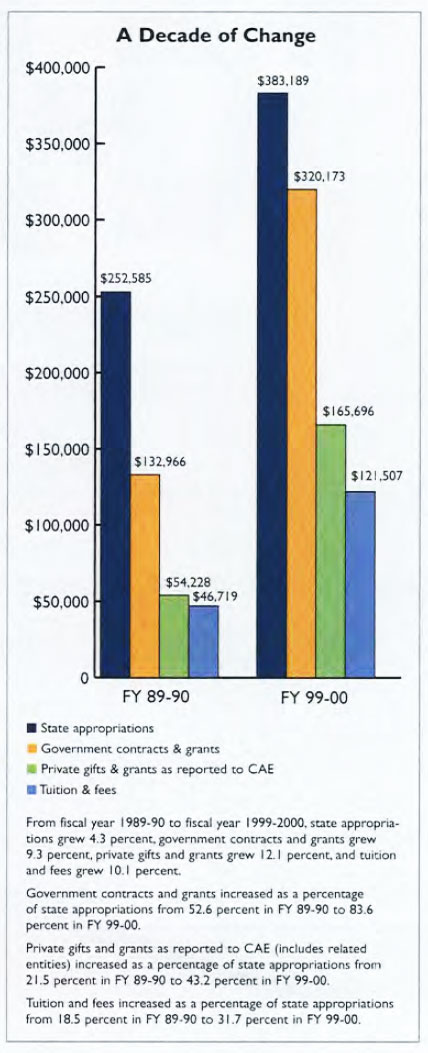Enlightened Self-Interest
Posted on Sept. 10, 2001A slowing economy and the ongoing costs from Hurricane Floyd — as well as enrollment increases, rising Medicaid and health-care costs for state employees, and two adverse court decisions — have left our state with a revenue shortfall of more than $500 million this year and the prospect of larger deficits next year and in years to come.
In response, some N.C. House members proposed draconian cuts in education; one proposal would have made up part of the shortfall from more than $37 million in Carolina’s “overhead receipts.” These funds are generated by research on diseases, such as cystic fibrosis and schizophrenia. That proposal would impede this research while doing little to address our state’s long-term financial problems.
Without new revenues, North Carolina cannot maintain its AAA credit rating, forcing the state to spend more of our University bond funds approved by voters last fall on interest payments instead of badly needed facilities. There was too little discussion about the cost of an unprepared work force and the inability to prepare college students to compete in the global economy. The loss of North Carolina’s credit rating would result in economic damage that would cost every taxpayer more in the future.
Often, University leaders are encouraged to become more self-sufficient, and that has been happening. While state appropriations to Carolina continue to grow, they have done so at a much slower rate than have tuition increases, private philanthropy and research funding. And the percentage  of Carolina’s revenues coming from state appropriations has declined steadily, from 42.5 percent in 1985-86 to 29.5 percent in 1999-2000. Carolina’s faculty through their research now bring into North Carolina almost as much revenue as the General Assembly appropriates to UNC; this past year, our faculty generated an average of$150,000 each in research awards.
of Carolina’s revenues coming from state appropriations has declined steadily, from 42.5 percent in 1985-86 to 29.5 percent in 1999-2000. Carolina’s faculty through their research now bring into North Carolina almost as much revenue as the General Assembly appropriates to UNC; this past year, our faculty generated an average of$150,000 each in research awards.
While North Carolina’s manufacturing economy is slowing, it is clear that our state’s economic future is tied directly to the knowledge industry and heavily dependent upon our University as well as other area institutions. Studies show that for every $1 invested in Carolina, an additional $3 are generated. Where else can our state make a wiser investment than in Carolina?
Still, not only do some legislators threaten to take the overhead receipts generated by our faculty in vigorous national competition, the state also insists on maintaining antiquated and stifling regulatory controls in purchasing, construction and personnel. Such controls no longer serve the state since they add unnecessary delays, raise costs and make it difficult to recruit and retain the best faculty and staff.
A resolution unanimously adopted by our Board of Trustees noted that Carolina “understands the dilemma of North Carolina’s lawmakers” and “fully expects to do its part in helping the state resolve its budget crisis.” Our trustees also noted that “our public schools, community colleges and universities are our state’s best investment to ensure a speedy economic recovery” and urged the General Assembly “to consider both cost- cutting and revenue enhancements together as a way most likely to preserve and protect North Carolina’s educational system in service to the future of the state and its citizens.”
Enlightened self-interest should prompt North Carolina legislators to provide continuing, generous financial support to our campus and much needed regulatory relief in purchasing, construction and personnel. Please share these messages with your North Carolina legislators in the weeks and months ahead. You will help preserve the value of your diploma and help your neighbors by providing for a brighter economic future for all North Carolinians.
Yours at Carolina,

Douglas S. Dibbert ’70
